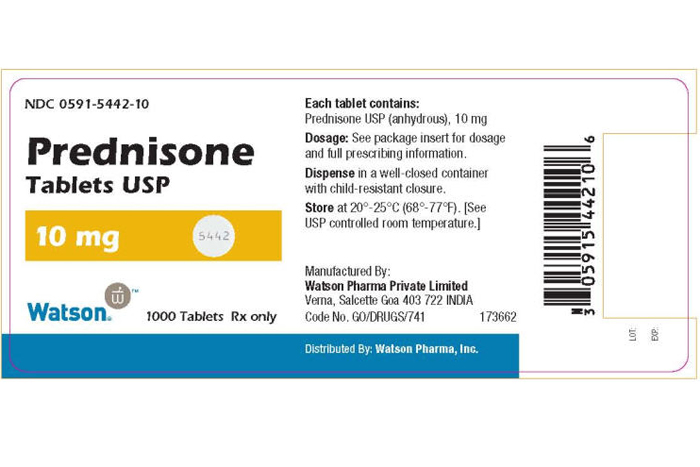What is Prednisone?

Prednisone is a medication designed to prevent the release of substances in the body that can cause inflammation, thereby lowering redness and swelling. It can treat low corticosteroid levels, or other conditions in patients with normal corticosteroid levels, such as allergic disorders, skin conditions, ulcerative colitis, arthritis, lupus, psoriasis, and breathing disorders.
Prednisone can also be used to treat the symptoms of certain types of cancer. It is sometimes used with antibiotics to treat a certain type of pneumonia in patients with HIV/AIDS.
Taking prednisone
Prednisone is available as a tablet, a liquid, and a concentrated solution, designed to be taken orally. Dosing and schedule depends entirely on the patient and the condition being treated. The NIH recommends discussing any grapefruit and grapefruit juice intake with your doctor, as it can affect the absorption of the medication.
Because prednisone can cause unusual results in some medical tests, it’s important to tell any doctor who treats you that you are using prednisone. The NIH recommends wearing a medical alert tag or carrying an ID card stating that you take prednisone in case you end up in an emergency room and are unable to communicate.
The NIH recommends taking prednisone with food and to strictly follow the doctor’s dosing instructions. If taking the drug as a liquid, measure it with the special dose-measuring spoon or medicine cup, which a pharmacist can provide. Delayed-release tablets should be kept whole as a dosage, and it’s not recommended that patients crush, chew, or break the tablet. Changing the dosage without consulting a physician can cause side effects, including withdrawal and overdose.
Because of the nature of prednisone, it can cause complications when taken at the same time as other medications. According to the NIH, these drugs include: antibiotics, antifungal medications, birth control pills and other hormones, blood thinners, diuretics, HIV or AIDS medication, insulin, NSAIDs and seizure medications. If you are taking any of these medications, the NIH recommends telling your doctor before taking prednisone.
The NIH also recommends telling your doctor if you are taking any herbal nutritional supplements, especially St. John's wort.
Get the world’s most fascinating discoveries delivered straight to your inbox.
Risks of prednisone
Prednisone is also designed to weaken the immune system, so a patient using the drug is at a higher risk of infection or being sick. It is important for those on prednisone to avoid being near ill people.
According to the National Institutes of Health, patients considering or taking prednisone should take special precautions:
- Tell your doctor if you have an eye infection; diabetes; high blood pressure; emotional problems; mental illness; myasthenia gravis (a condition in which the muscles become weak); osteoporosis (condition in which the bones become weak and fragile and can break easily); seizures; tuberculosis (TB); ulcers; or liver, kidney, intestinal, heart, or thyroid disease.
- Do not have any vaccinations without talking to your doctor.
- Call your doctor immediately if you experience shortness of breath, severe pain in the upper abdomen, bloody or tarry stools, depression, personality changes, vision problems, or any eye pain.
Long-term use of any steroid, including prednisone, can cause bone loss or osteoporosis. The risk is higher in smokers, those who do not exercise, and those with vitamin D/calcium deficiencies. These are important factors to weigh with your doctor. Your doctor may recommend a low-salt, high potassium, and/or high calcium diet.
For pregnant women, prednisone can cause low weight birth or other birth defects if taken in the first trimester. Prednisone can also be passed onto a nursing baby through breast milk. According to the NIH, discuss proper birth control methods and let your doctor know if you plan to get pregnant or are pregnant while taking this medication.
The use of prednisone is carefully monitored in children, as the corticosteroid can cause problems with growth. It is recommended that you alert your child’s doctor if you think that your child’s growth has been affected while using prednisone.
Side effects of prednisone
Like other steroids, prednisone has a number of unpleasant side effects. Commonly, patients will experience:
- Sleep problems
- Headaches
- Dizziness
- Mood changes
- Increased appetite and weight gain
- Acne
- Dry skin
- Slow wound healing
Changes in the shape and location of body fat, particularly in the arms, legs, face, neck, breasts, and waist
- According to the NIH, call your doctor if you experience:
- Blurred vision
- Rapid weight gain
- Shortness of breath
- Severe depression
- Seizure
- Bloody stools
- Bloody cough
- Pancreatitis
- Potassium deficiency
- Dangerously high blood pressure
Prednisone & alcohol
Side effects can be amplified if prednisone is consumed in conjunction with alcohol, so safetymedical.com recommends avoiding alcohol.
Alcohol can also exacerbate the mental effects of prednisone, as it is a depressant. It can also increase irritation to the gastrointestinal system, as well as lowering the immune system. Combining alcohol and prednisone can worsen the possibility of any of the listed side effects.
Abuse and overdose
Prednisone is not an addictive substance. However, when going off of the medication, it’s important to work with your doctor to avoid withdrawal symptoms. Withdrawal symptoms of prednisone include weakness, fatigue, weight loss, nausea, low blood pressure, and menstrual changes.
Prednisone overdoses are generally not life-threatening. However, like with any drug, if you suspect an overdose, call poison control or emergency medical services.
Long-term high doses of steroids can cause thinning skin, easy bruising, body shape changes, increased body hair and acne, menstrual problems, impotence, and sexual performance issues. Though none of these problems are life-threatening, steroid abuse can still lead to other health complications.
Prednisone for dogs
Prednisone is also designed for similar use in pets. It is used by veterinarians to reduce inflammation and suppress the immune system. According to PetMD, the drug should not be administered to pregnant pets or pets with diabetes. Prolonged use can lead to diabetes or Cushing’s disease.
Side effects in pets include:
- Increased drinking and urination
- Inhibited growth in young pets
- Panting
- Vomiting
- Diarrhea
- Ulceration of the digestive tract
- Lethargy
- Aggression
- Delayed healing
 Live Science Plus
Live Science Plus





